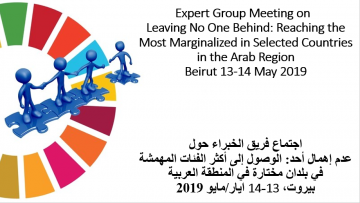
Beirut, 14 May 2019 (ESCWA)--Recent studies show that youth unemployment’s rates in the Arab region are twice as high as the global average and 40% of the Arab population is suffering from multi-dimensional poverty. In this context, a 2-day expert group meeting (EGM) at the United Nations Economic and Social Commission for Western Asia (ESCWA) in Beirut discussed “Leaving No One Behind: Reaching the Most Marginalized in Selected Countries in the Arab Region,” namely Egypt, Lebanon, and Tunisia.
The meeting, organized on 13-14 May by ESCWA in partnership with the United Nations Educational, Scientific and Cultural Organization (UNESCO) and the Centre for Lebanese Studies (CLS) at the Lebanese American University (LAU), also reviewed a forthcoming report bearing the same title, and highlighting three case studies; inhabitants of the rural South and Western parts of Tunisia, the cemetery dwellers in Egypt, and residents of the Tabbaneh area in Northern Lebanon.
“The population affected by conflicts in the Arab region is expected to rise to over 300 million by 2020; fast changes that reshape the region and severely affect the most vulnerable,” said ESCWA Executive Secretary Rola Dashti in her opening remarks.
“The lack of reliable, timely and segregated data prevents reaching a complete knowledge of the situation of those who are marginalized, and hence meeting their needs. This requires governments to invest in providing good data,” she noted. Dashti urged to come up with non-traditional mechanisms of implementation, follow up and accountability. “To change these circumstances, just and all-inclusive economic and social policies that do not leave anyone behind are a must,” she added.
Experts discussed the root causes of social exclusion and marginalization in the Arab region in general and in the selected countries in particular. They concluded with policy recommendations on how to combat socio-economic marginalization through the identification of special or targeted measures.
For her part, Programme Specialist for Social and Human Sciences at UNESCO Seiko Sugita highlighted the causes of inequality in the Arab region, including high levels of violence and conflict; military occupation causing displacement of persons; economic liberalization; and the adoption of marketed development strategies.
“The integrated nature of the 2030 Agenda and its 17 Sustainable Development Goals (SDGs) requires greater policy coherence at the national, regional and international levels that can be obtained through stronger links between social science research and public policy- making,” she underscored.
According to studies, the number of cemetery dwellers in Egypt in 2008 was 1.5 million people and it is estimated to have currently reached more than 1.9 million. As for Lebanon, studies report that the Tabbaneh area is suffering from marginalization mainly due to the lack of political will and the central administration while the most marginalized groups are day labourers, youth, elderly and people with disabilities.
On the other hand, economic exclusion in the rural South and Western parts of Tunisia is due to many factors including failure in attracting international and national investments; high youth unemployment rates, low population density, lack of industrialization and modernization in new jobs all of which cause major and continuous waves of internal displacement and migration.
The EGM saw a keynote statement by the Representative for the United Nations High Commissioner for Refugees (UNHCR) in Lebanon, Ms. Mireille Girard, who tackled the issue of refugees by numbers.
“More people have been forced to flee their homes than at any time since the Second World War, and this number continues to grow: currently, more than 68 million people are forcibly displaced globally; among them, more than 25 million are refugees; and the numbers continue to grow,” she said. “As it is true that we have witnessed huge progress in the fight against poverty and injustice, too many people – the most vulnerable, those that are excluded, disadvantaged and the most at risk of violence and discrimination – still face terrible inequalities when it comes to accessing resources and rights,” she added.
Meanwhile, LAU President Joseph Jabbra highlighted the longstanding role of the University and CLS in achieving social equality. “We, at the Lebanese American University, seek to achieve social equality through our academic programs and community engagement. This is our heritage which began in 1835 with the establishment of a school for girls during the Ottoman empire,” he said.
“Achieving social justice and equality is a duty that we, as educators and academics in LAU, work on achieving despite all challenges facing our region, and the ultimate goal won't be reached until we concert all the required efforts,” he elaborated.
Presentations during the sessions also revolved around the human rights situation of migrants and refugees in Libya; exclusion in the Arab Region from a gender perspective, and understanding inclusive education based on case studies in five countries of the Arab region.
Photo album
For more information:
-Nabil Abu-Dargham, Head, ESCWA Communication and Information Unit,
+961-70-993-144; email: dargham@un.org
-Ms Rania Harb, Public Information Assistant, +961-70-008-879; email: harb1@un.org





